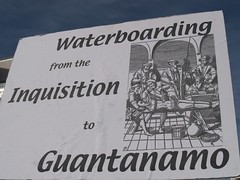What's it like to have no shame? Ask the editors of the Wall Street Journal. Their Wiretap Politics op-ed is a perfect example of purposely misleading rhetoric. Time to break out the red pen.
1. Note that lack of amnesty for law-breaking corporations is characterized as a "problem", as opposed to "how the law works."
2. This is not what the bill actually does -- a blatant distortion. The text of the bill is freely available. The bill does not merely allow warrantless wiretaps on communications that "happen to pass through U.S. switching networks", it allows warrantless wiretaps on communications where one endpoint is a US citizen inside the US, as long as that person is not the designated target. It's right there in section 702 b.(Which includes the hilarious clause that the surveillance "shall be conducted in a manner consistent with the fourth amendment to the Constitution of the United States." Shouldn't that go without saying?)
Maybe like Joe Klein the WSJ editors don't have the inclination and legal background (AKA basic English language comprehension) to read the text of the bill and figure out what it says? Or maybe they are just cynical manipulators. Take your pick.
3. The ACLU is a favorite punching-bag of conservatives -- somehow fighting for civil liberties is anti-American these days. But the real gem here is the notion that the "crime" these companies committed was "answering a President's request for assistance" -- which is not a crime at all. Helping the President is not illegal, so why aren't these cases instantly thrown out of court? If the only "crime" here is a non-crime then why do these companies need amnesty?
The "logic" here is extraordinary: these companies have done nothing illegal, so they need protection from lawsuits, or else they might be found guilty in court of engaging in illegal activities.
Only lawbreakers benefit from amnesty.
The Bush Administration is aware of Mr. Reid's plans and is debating a response, and we hope Chief of Staff Josh Bolten and the President don't flinch now. Immunity for the telcos is not only fair but crucial. As the Senate Intelligence Committee concluded, these companies acted in response to written requests or directives assuring that their activities were authorized by the President. "The extension of immunity," wrote the panel in its conference report, "reflects the Committee's determination that electronic communication service providers acted on a good faith belief that the President's program, and their assistance, was lawful."
Even I know that ignorance of the law is no excuse for lawbreaking, which is all the above amounts to. At least one telecom company, Qwest, did not believe that participating in warrantless wiretapping was legal. Perhaps Qwest lawyers took the radical step of reading relevant laws.
Title 18 of the US Code already includes a good-faith exemption. It's right here in Section (d). Nothing prevents these companies from using that defense in court.
Who did the Senate Committee call as witnesses? What evidence did they consider? We have no idea. We have a very well-defined system for determining innocence and guilt in this country, and it does not involve the legislative branch making broad proclamations following secretive procedures.
Again, the logic at the root is that these companies need amnesty because they did nothing wrong. Curious.
Mr. Bush also has all the high political cards here. Most Americans think it's preposterous that a judge should have to approve listening to foreign enemies1, and a fight over this in an election year is the last thing smart Democrats want.2 Mr. Bush could help his successor and the public by promising to veto any FISA extension that isn't permanent and infringes too much on Presidential war powers. If this issue were such good politics for Democrats, Chris Dodd might have done better than sixth in Iowa.3
1. Here we have the common "most Americans think exactly what I think" ploy. In this case not only is it a lazy and unsupported argument but also irrelevant, as Democrats do support wireless wiretapping for "communications overseas that happen to pass through U.S. switching networks."
2. And here is another common ploy, the old "the best advice for Democrats is to act exactly like Republicans." Funny how that is always the case. We were told that Democrats were making a huge mistake by opposing the War in Iraq, followed by Democrats sweeping into control of Congress on exactly that platform. According to the WSJ the President "holds the high political cards" and it would be wise for Democrats to follow the lead of an historically unpopular President they were elected to oppose.
3. There is an obvious logical fallacy here in stating that a candidate's issues must be unpopular because candidate did poorly in Iowa, especially a candidate like Dodd that was never given any media attention. By that logic all of Guiliani's issues are unpopular as well, something you won't see the WSJ arguing any time soon. And in fact Dodd received his biggest bumps in popularity and campaign contributions when he championed these issues - it was good politics for Dodd.
The more subtle error here is that the argument has shifted entirely from what is good for US security to what is good politics for Democrats. The argument that we should violate the Fourth Amendment because it is a good career move for politicians is absurd on every level. Why should the citizens of a country or the staff of a newspaper editorial board encourage political careerism?
This editorial is not just silly or poorly reasoned, it contains blatant misrepresentations. Democrats do not oppose modernization fixes to FISA that make foreign-to-foreign warrantless wiretaps legal. That is pure fiction.
It should be scandalous when a major newspaper puts out editorials that deliberately mislead. But instead it is ordinary. Nearly every editorial and every TV pundit appearance in favor of telecom amnesty includes the same mischaracterizations of both what Democrats support and what the bills actually do. These errors have been repeatedly corrected for months -- at this point they must be purposeful. It's not in the best interests of telecom amnesty supporters to deliver the unadulterated truth -- so they don't.




